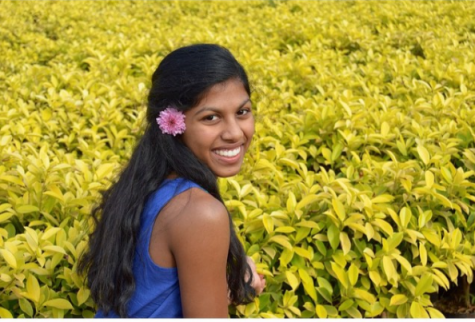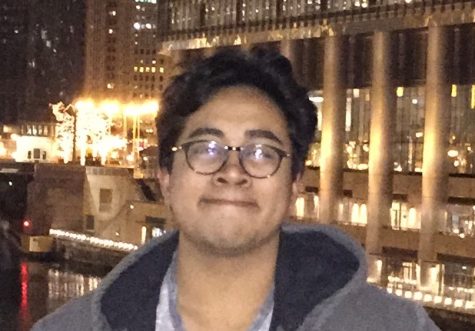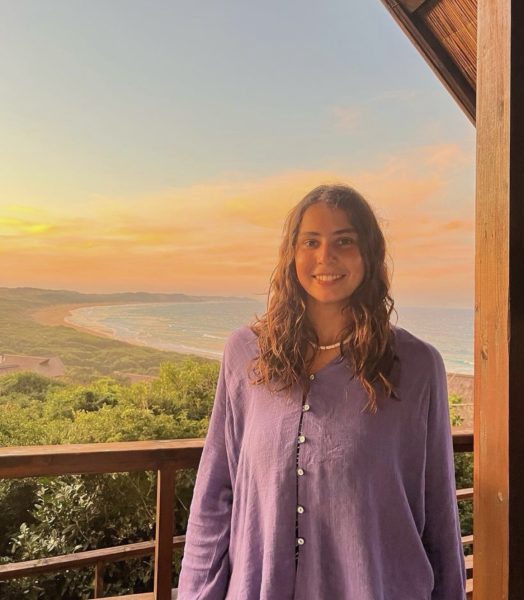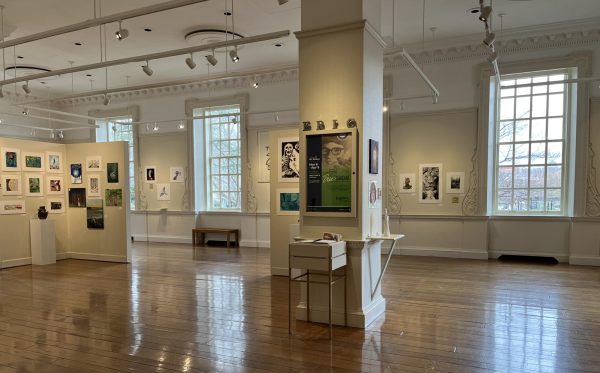Many African-American students find isolating and presumptive culture at Uni
Early in the fall semester of last year, current junior Daniel Ramkumar met with Dr. Radnitzer and Dr. Walkington to discuss the underrepresentation of black students, something he had come to realize was a serious problem. Despite drawing 85% of its students from Champaign-Urbana, an area with 15% black population, only 5% of Uni’s students are black. But Ramkumar wasn’t bringing up a new issue to the administrators, Radnitzer and Walkington had previously been aware of the situation.
“They said that it is something the school was concerned and thinking about, but never really had a concrete idea of what to do. So they told me to think about it more, think of some things that I could do,” says Ramkumar.
The discussion blossomed into an initiative called Zero Degrees of Separation. After two semesters of work, Ramkumar’s project grew, eventually recruiting ten Uni students to help him. He also recruited ten Central and Centennial students, with help of Unit 4 Assistant Superintendent for Achievement and Equity, Angela Smith. These students, the majority of whom were black, helped discuss different perceptions of Uni, in order to encourage black students to come to the school. However, after group discussions and a visit to Uni by the Unit 4 students, a different issue began to take center stage: the experiences of black students already at Uni.
“[W]e realized the problem was much more the atmosphere. […] The environment here isn’t one that promotes a healthy space for a lot of underrepresented minority students. That’s what it is right now and that’s what our goal is, working towards creating an atmosphere that fosters those students”, says Ramkumar.
The underrepresentation, he says, resulted in “a feeling of isolation”.
Raphaelle Mboyo, an African-American senior, concurs with Ramkumar’s sentiment. Mboyo says that during her subfreshman year “it was tough, it was really hard to identify with anyone.” This inability to identify, she says, persists through to today, although it is less significant.
Mboyo is not alone in this feeling. Senior Aja Trask says that when she came to the school, she was “very conscious of the fact that” she “was a minority in that space [Uni]”. Sophomore Asante Woods says that there have been numerous times where he was explicitly aware of his status as one of a few black students in the room at a time.
“It’s not half-and-half, or even close to a similar amount of people. Here there are like five people that you know of that are [African-American]”, says Woods.
But according to multiple black students, the underrepresentation causes more than just a feeling of isolation – the underrepresentation impacts non-black students as well. By having a significant lack of African-American individuals, an atmosphere of ignorance has been created, in which expectations and assumptions are placed on the black students.
Take, for example, the experience of junior Camden Coleman. To many students, being fawned over from the very first day you start at a new school is something to be desired. But to Coleman, the attention from other students served as a constant indication that he was not like most of the students there.
“[Other students] will be like ‘Oh my god, you’re the only black kid’ and ‘Oh my god, Camden’s so cool’, or he’s this, he’s that. They don’t even know who I am. […] You get a lot of attention that’s not warranted, because people are like, ‘He must be cool, he must be this, this, this, because he’s black.’”
Rahi Miraftab-Salo, a junior, recalled that when Asante Woods was a prospective subfreshman, “everyone crowded around him, they were all over him”. Omeed Miraftab-Salo, also a junior, says that in these situations, when there is a new black student, Uni students tend to assume athleticism, specifically in the realm of basketball.
“What I find is that people are always looking for something they can get out of you. A lot of the times it’s like they’re looking for someone who can be funny and make black jokes or somebody who can be good at the basketball team or somebody who can be good on the track team,” says Coleman.
This preconceived notion of a “cool black kid” as Coleman puts it, affects how people will speak to him as well.
“There’s a new thing, talking black. Saying, ‘What’s up, man?’ or ‘What’s Gucci?’. It’s this different thing that people switch into when talking to black people. […] Some of it on their side was positive, some of it was negative, but to me it was all negative because it was just being treated differently.”
However, although some of these assumptions could be explained by good intentions, many of these expectations and assumptions certainly didn’t seem nearly as well-meaning.
A commonly cited experience of black Uni students, by the Miraftab-Salos, Trask, Mboyo, and Coleman, was people saying or suggesting that they don’t deserve to be at the school. These experiences occurred as early as the subfreshman year of the students who experienced it, when it was often suggested that they had scored lower on their SSAT and contributed less effort to getting into Uni than their non-black counterparts. The implication was often that they got in purely by virtue of affirmative action.
Comments like these imply a low expectation for black students within the realm of academics.
“As a black girl in this school, I feel like people already assume I’m less intelligent. In part because people have straight up made comments like that,” says Senior Aja Trask.
Trask recalls one experience in which she assisted a classmate with school work but they refused to believe her answer. “I told them, and they didn’t believe me […] then they looked it up and I was right… There are certain people I feel like they would have believed, and not have had to ask again, which is frustrating,” she said.
These implications have affected her further than her high school experience, affecting how she sees the college process. “I think that’s where my devaluation as I go into college stuff comes from, because like, I feel like I am only getting into certain schools because I am a black girl who is gonna go into STEM”, Trask added.
Mboyo has experienced this devaluation of black people as well.
“I remember driving down the street with my mom and I’d see this black person driving like a brand-new Mercedes and I’d be like, ‘Oh, dang! How’s he driving that, he’s black?’ and I think that’s the one thing that developed from the culture of Uni that I’m most ashamed of. […] The way that this nation works in general, the whole thing that black people shouldn’t be successful, I feel like the atmosphere at Uni added to that a little bit more”, says Mboyo
But solving this problem is not so simple as it may seem. To some black students, the environment at Uni isn’t entirely ideal for a discussion about these, or any, race-related issues.
As Raphaelle Mboyo says, “People talk about [these issues] and they talk about stuff like that based off things that they got off the internet or seen on the news. They’re forming opinions based off of that instead of stopping and listening to the side of the conversation of someone who’s lived through it. […] People talk about black issues as if they are a black person themselves and have gone through these challenges.”
Because Uni is a politically active culture, they also tend to be politically active about issues and topics that affect underrepresented demographics at Uni. However, according to Trask and Mboyo, often when those discussions do come up, they fail to defer to those minority individuals despite their having lived through it.
“[T]here are always those white people that complain, that are like, ‘Oh, why do they do this? Why weren’t we invited? I feel so left out, why can’t we be part of the conversation?’”, says Mboyo.
“People will try to tell me about my own culture,” says Trask, “And it’s like frustrating and like I think that we need, and this is like in general with academics period, because like there’s this environment that we already know everything instead of there’s so much we can learn”.
Mboyo says that this applies not only to discussion, but to other events as well. She cited one instance during prom when several African-American students took a picture together and non-black individuals felt excluded. And often times when opinions are raised about certain topics, like the discussion on racial slurs by Student Council, they are often brushed over, according to Mboyo, as if they were an unnecessary discussion.
Or, like in the case of Asante Woods, they feel that they can’t or shouldn’t raise their voice. The outnumbered black population, Woods says, causes him to closet his opinions. “[W]hen someone makes a comment that may be kind of racially out of the box, I kind of try to just lay low and not really say much about it. But at another school, I think that would definitely be more known… I think a simple way of saying it is, I’m outnumbered, but I don’t want… it to seem militarian or it’s just a war between blacks and everyone else. But it’s very different when you’re… one of few people trying to make a point to a large group of students.”
Trask cites both her status as an African-American and as a woman as factors in why her voice isn’t heard.
“It’s hard to pinpoint […] You’ll be talking with people and then suddenly your voice will be lost because it’s not valued in a discussion or something. Which is a very subtle thing and people will often say, ‘Hey it’s not because you’re black.’ But it often feels like that – being black and a girl – because there’s a very male-dominant atmosphere, because the guys are the one who are putting their ideas out there,” Trask says
Conversely, however, Trask also recognizes that at times people are too trusting of her opinion as a black student. “In classes where we are talking about minority issues, people are very attentive when I talk. And it’s great, but I don’t want you to listen to me just because I’m black, I want you to listen to me because I have something valuable to say. […] There’s a lot about my own situation and culture that I don’t quite understand.”
“I feel like the difference between Uni [and other schools] is that they know that they’re right because they’re liberal so it’s like ‘Oh, we should definitely include African-Americans and make them feel better’, but you’re still treating them different,” says Omeed Miraftab-Salo.
All of these experiences, however, were felt much less by the underclassmen.
Othniel Carr, a freshman who transferred this year, says that he’s thoroughly enjoyed his experience at Uni. Carr says he doesn’t pay attention to race when it comes to his classmates. Sophomore Macheila Anderson, like Carr, also claimed that she “didn’t focus on these things”. Blessing Omoniyi, a subfreshman, is not sure that the lack of diversity is an issue.
Mboyo may have an explanation for this trend among underclassmen. Talking about her perception of race within Uni, she says “I didn’t notice any of these things until late sophomore/junior year.” She also says that she continues to learn more about these issues as a senior.
The solution to these issues is unclear. Most agree that making the black population an accurate representation of the demographics in Champaign-Urbana would help diminish the problems. But not every issue has roots in black underrepresentation at Uni.
Trask believes that the problem of Uni’s atmosphere goes to the direct source of students’ parents.
“A lot of people’s parents also don’t know things or don’t expose their children to other cultures […]There are some kids that are going to these private school after private schools where there’s majority white kids and just not minority kids, and I feel like they need to go to different spaces,” says Trask.
Ramkumar thinks that underrepresentation cannot be solved until the culture of Uni for black students already here is solved first. He believes not all of the assumptions and expectations come as a result of underrepresentation.
“It’s mainly mindsets of other students not being aware of certain things they say just because the lack of the population creating that atmosphere […] I think one of the biggest problems is just unawareness of the problem. So just bringing light to the fact that there is this problem that students experience [is our goal],” says Ramkumar.

Hello! I am currently a junior and I have been in journalism since sophomore year. In my free time, I like to run, play soccer, and watch tv.

I started journalism first semester of junior year. In my free time, I like to read and write. I also like superheroes and video games. My favorite superhero...



Sharlene Denos • Feb 21, 2017 at 6:12 pm
I want to thank Saahithi & Umar for writing this piece and I also want to thank all of the students who shared their experiences. That takes courage and now it is up to the rest of us to listen to what you’ve said and allow it to push us to question our assumptions and behaviors and the culture we’ve created at the school. Increasing the diversity among faculty is crucial to improving the racial climate at Uni High in my opinion, and I hope that we will continue to make efforts to recruit and retain faculty and administrators of color in the future. Thanks again to everyone who contributed to this urgent and excellent piece of journalism.
Jon Hoekstra • Apr 13, 2017 at 9:53 pm
Yes! This is a well written and substantial piece.
Thanks to the authors and to the students who granted interviews.
It is a shame how excellence can bleed into elitism. To every kid who feels out of place: keep after it. Show up, work hard and take your rightful place at the table: leading, learning, listening and speaking your truth.